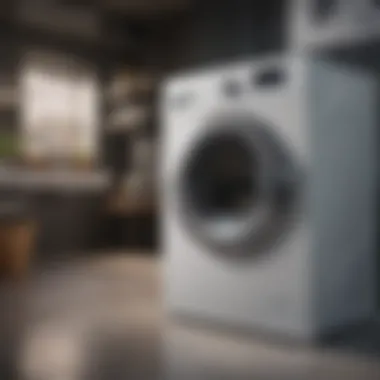The Best Clothes Washer: A Comprehensive Guide


Intro
Selecting the right clothes washer is not a trivial task. It requires a deep understanding of features, efficiency, and the specific needs of your household. This article will delve into the best options on the market, guiding you through various vital aspects such as size, capacity, technology, and maintenance. You will find insights that not only cater to utility but also align with your interior design and lifestyle preferences.
The clothes washer is often a focal point in a laundry area, and making a well-informed choice can significantly enhance the functionality and aesthetics of your space. Homeowners and design enthusiasts alike will benefit from the careful analysis provided in this guide. It is important to recognize that each washing machine has its unique characteristics—understanding these will enable you to make an informed decision that suits your needs.
Interior Design Tips
When integrating a clothes washer into your home, consider its placement and impact on your overall decor. A washer is not merely an appliance; it is an integral part of your home's design scheme.
Trendy Design Ideas
Many contemporary washers come in sleek designs that can complement modern interiors. For example, front-loading machines can be stacked or placed under counters, offering a clean look. Some models come with customizable panels, allowing you to select finishes that match your cabinetry or wall colors.
Color Schemes and Combinations
Choosing the right color for your washer can harmonize or contrast effectively with your space. Neutrals like white, black, or stainless steel are common but can also be found in bold colors to add a pop to your laundry room. When selecting colors, think about how they will look alongside your other appliances and cabinetry.
Furniture Arrangement Techniques
The arrangement of furniture and appliances can affect the flow of your laundry area. Ensure there is enough space around the washer for loading and unloading. Consider creating a countertop space above or beside the washer for folding clothes. This arrangement improves convenience and overall functionality.
Ending
Choosing the right clothes washer involves more than just assessing performance specifications. With thoughtful consideration of design elements, you can create a laundry space that aligns with your lifestyle and home aesthetic. Preceding discussions will further analyze each aspect to ensure a holistic understanding of what best suits your needs.
Understanding Laundry Needs
Laundry is a crucial household chore that often gets overlooked until the last minute. Understanding the laundry needs of your household can drastically improve the efficiency of this task. Properly assessing your requirements leads to informed decisions about the type of washing machine you need. It ensures that you select the right features, capacity, and technology to handle your specific laundry demands.
Assessing Household Size
Household size is a fundamental factor to consider when choosing a washing machine. Different sizes demand different capacities. A small household might manage well with a compact front-load washer, while larger families may require a model with a higher load capacity.
Assess your weekly laundry volume. For instance, a family of four will likely accumulate more dirty clothes than a couple. Choosing a washer that can accommodate your laundry load helps to minimize the number of cycles you need to run. This can save both time and energy. Many modern washing machines come with features that increase efficiency in larger households. Key factors to contemplate include:
- Frequency of laundry loads.
- The type of clothing typically washed.
- The need for quick washes for smaller loads.
Understanding Fabric Care
Different fabrics require varying levels of care. High-quality fabrics like silk or wool need gentle treatment, while durable materials like cotton can withstand harsher cycles. An understanding of these needs helps in choosing a washing machine with settings that cater specifically to fabric type.
Most washing machines come equipped with various wash cycles designed for specific fabrics. Here are a few common fabric types and their care considerations:
- Cotton: Standard cycle usually suffices. Hot water can be used if needed.
- Delicates: Require a gentle cycle to avoid damage.
- Wool: Should be washed in a dedicated wool cycle to prevent shrinking.
Owning a washing machine that properly accommodates these different fabric types is essential for maintaining their quality and prolonging their lifespan.
Moreover, understanding fabric care adds efficiency by ensuring that clothes are cleaned at the optimal settings, which can correlate to lower energy consumption as well. This aligns not just with hygiene but also with sustainability goals.
"Choosing the right washing machine means understanding your specific laundry needs and the fabric care requirements of your garments. It is about balancing efficiency, convenience, and the longevity of your clothes."


In summary, understanding laundry needs encompasses a thorough assessment of household size and fabric care requirements. These considerations are important for selecting a washer that fulfills your daily demands effectively.
Types of Washing Machines
Understanding the different types of washing machines is crucial for making an informed decision when purchasing one. Each type has its unique features, benefits, and considerations that can significantly impact your laundry experience. With this knowledge, homeowners can choose a model that fits their needs and lifestyle.
Front-Load Washers
Front-load washers offer several advantages. They are generally more energy-efficient compared to their top-load counterparts. This is due to their horizontal drum design, which requires less water and energy to function. They also tend to clean clothes more effectively, removing dirt and stains with less agitation. Additionally, the design allows for stacking with dryers, making them ideal for homes with limited space.
However, they do require more maintenance. Front-load models can develop odor issues and mildew if not maintained with regular cleaning cycles. Furthermore, the loading process might be less convenient for some users, especially those with physical limitations, as bending down can be challenging.
Top-Load Washers
Top-load washers remain popular due to their accessibility and ease of use. Loading laundry from the top can be more convenient for many. Most top-load models also have shorter wash cycles, which can be an appealing factor for busy households. They typically offer a variety of options for different wash types and capacities.
On the downside, top-load washers usually use more water and energy compared to front-load machines. The cleaning efficiency can also be lower because of the agitator design, which can be harsher on clothes over time. It is vital to consider these factors when evaluating the suitability of a top-load washer for your home.
Washer-Dryer Combos
Washer-dryer combos present a space-saving solution for small living spaces. They combine washing and drying functions in a single machine, which can be convenient for apartments or homes with limited laundry facilities. Many models come equipped with advanced features like steam cleaning and various wash cycles, which enhance versatility.
Despite their advantages, washer-dryer combos typically have smaller load capacities than standalone units. This can result in longer wash and dry cycles, as the washing and drying processes cannot occur simultaneously. Also, their drying efficiency may not match that of a dedicated dryer. Therefore, understanding your laundry habits is essential when considering this option.
Ultimately, the choice between front-load, top-load, or combo machines depends on individual preferences, household size, and available space. Analyze your needs carefully before making a decision to ensure that your selection aligns with your lifestyle.
Key Features to Consider
When selecting a clothes washer, understanding the key features can transform the decision-making process. A washing machine is not just an appliance; it plays a significant role in managing laundry efficiently. Different washing machines come with unique features tailored to various needs. Knowing these features helps in pinpointing what aligns with your lifestyle, saving time and energy while ensuring garments remain in pristine condition.
Load Capacity
Load capacity is a critical factor when choosing a washing machine. Generally, it refers to the maximum weight of laundry a washer can handle in a single cycle. It is important to match the machine's capacity with household needs. A larger capacity, say between 4.5 and 5.5 cubic feet, may suit families who do frequent, larger loads. Conversely, smaller units might be sufficient for individuals or couples. Oversized loads can lead to inefficient washing as the machine often struggles with distribution. Opting for a washer with an appropriate load capacity can translate to fewer cycles, saving water and energy.
Energy Efficiency
Energy efficiency is another important aspect of modern washing machines. Many brands show energy ratings labelled as Energy Star, indicating they use less electricity and water compared to traditional models. These machines contribute to lower utility bills over time, making them both cost-effective and environmentally friendly. According to research, energy-efficient washers can save a household about $200 annually on electricity costs alone. Buyers should consider investing in technology that minimizes resource use without sacrificing performance, as this choice leads to long-term benefits.
Spin Speed Variability
Spin speed variability is an often-overlooked feature. Spin speed is measured in revolutions per minute (RPM) and determines how quickly the washer extracts water from clothes. High RPMs lead to drier clothes post-wash, which can reduce drying time and energy used in the subsequent drying phase. Many washing machines offer adjustable spin speeds, allowing customization based on fabric type; delicate items might require lower speeds while heavier fabrics can benefit from high-speed options. An ideal washing machine will provide a spectrum of spin speeds to suit diverse fabric needs.
Noise Level
Noise level is also an essential consideration. A quieter machine can enhance household tranquility, especially if the laundry area is located near living spaces or bedrooms. Washing machine noise can vary significantly; some higher-end models operate at around 50 decibels, similar to a quiet conversation. Look for features like anti-vibration technology or specialized sound insulation that help mitigate noise. For those who value peace in their home, investing in a quiet washer can greatly improve everyday comfort.
"Investing in the right washing machine is not just about functionality; it's about integrating seamlessly into your lifestyle."
In summary, evaluating load capacity, energy efficiency, spin speed variability, and noise level are pivotal. Each feature contributes to the overall effectiveness and satisfaction of using a washing machine. By focusing on these aspects, homeowners can ensure they choose a washer that meets their specific needs and expectations.
Technological Innovations


Technological advancements play a crucial role in the evolution of clothes washers. As homeowners seek machines that do more with less, the incorporation of innovative features has become essential. These advancements not only enhance efficiency but also align with modern lifestyles emphasizing convenience and sustainability. In this section, we will examine three significant innovations: smart features, sensor technology, and eco-friendly cycles. Each aspect offers distinct benefits, catering to varied user preferences and priorities.
Smart Features
Smart features in washing machines have gained prominence over the past few years. These capabilities allow users to remotely control and monitor their laundry cycles. Through smartphone applications, homeowners can start, pause, or receive notifications on their washing progress. Moreover, many smart washers are equipped with connectivity options for voice assistants like Amazon Alexa or Google Assistant.
Key benefits of smart features include:
- Remote Management: Start washing cycles, even when away from home.
- Cycle Monitoring: Receive alerts for when laundry is done, avoiding unnecessary trips to the machine.
- Energy Management: Monitor energy consumption in real-time, leading to better energy budgeting.
This technology continues to evolve, bringing the laundry experience closer to the demands of daily life.
Sensor Technology
Sensor technology has revolutionized how clothes washers operate. With sensors integrated into machines, there's a significant improvement in washing performance while reducing waste. These sensors can identify the size of the load and adjust water levels accordingly, ensuring optimal performance while conserving resources.
The most notable advantages of sensor technology are:
- Load Sensing: Automatically adjusts cycle and detergent based on load size.
- Water Efficiency: Minimizes water usage, contributing to sustainability.
- Cycle Optimization: Fine-tunes wash time and energy use, enhancing overall efficiency.
This technology not only simplifies the washing process but also aligns with eco-conscious practices.
Eco-Friendly Cycles
In response to the growing concern for environmental sustainability, many modern washers are equipped with eco-friendly cycles. These cycles are specially designed to use less water and energy, without compromising the outcome of the wash.
The merits of eco-friendly cycles include:
- Reduced Resource Consumption: These cycles often use cold water, decreasing energy costs while maintaining cleaning performance.
- Gentle Cleaning: Many eco-cycles use gentler agitation and longer wash times, which can prolong the life of clothes.
- Environmental Impact: Less water and detergent usage means reduced negative effects on waterways and ecosystems.
Maintenance and Longevity
Ensuring the longevity of a clothes washer significantly enhances its performance and reliability. Regular maintenance not only prolongs the life of the appliance but also optimizes its efficiency, leading to reduced energy consumption and lower utility bills. The cost of repairs or replacements can be high, making maintenance a crucial aspect for any homeowner.
Cleaning and maintaining your washer helps to avoid complications that could arise from dirt buildup, worn components, or neglected settings. For instance, keeping the drum clean can prevent odor issues and stains from transferring to your fabrics. Furthermore, staying on top of minor adjustments can mitigate the risk of serious malfunctions, allowing for peace of mind and operational efficiency.
Regular Cleaning Procedures
Regular cleaning is essential for maintaining a clothes washer. This practice helps ensure that the machine operates smoothly and high quality of wash remains intact. Here are some effective procedures to follow:
- Clean the drum: Run an empty cycle with hot water and a cup of white vinegar. This helps to remove any dirt, soap scum, or lingering odors.
- Wipe down the exterior: Dust and debris accumulate over time. Use a soft cloth with mild soap to clean the outer surfaces frequently.
- Check and clean the lint filter: Many washers have lint filters. These should be checked and cleaned periodically to enhance efficiency.
- Inspect hoses and seals: Look for cracks or leaks in the hoses. A preventive measure can save you from potential water damage. Replace seals if they show wear.
- Keep the detergent drawer clean: Residue can build up in the detergent drawer. Regular cleaning prevents blockages and ensures proper dispensing of detergents.
These steps are comprehesive and essential for maintaining a functional washing machine and should be done according to the manufacturer recommendations.
Common Troubleshooting Tips
Even with regular upkeep, issues can arise with washing machines. Knowing how to troubleshoot these problems can be invaluable. Below are some common tips to consider:
- Unusual Noises: If the washing machine begins to make strange noises, check for any foreign objects in the drum. Often, coins or small items can get lodged and cause rattling.
- Not Draining Properly: If water remains post-cycle, examine the drainage hose for clogs or kinks that might impede flow.
- Inaccurate Load Sensing: Sometimes, the washer may not sense the load accurately. Running a recalibration can help—refer to the manual for specific instructions on this.
- Error Codes: Many modern washers display error codes when there is a problem. Consult the manufacturer's guide to decode these messages and take appropriate action.
- Foul Smell: If a musty smell occurs, a thorough cleaning may be needed. Adding baking soda to a hot wash can eliminate unpleasant odors.
These troubleshooting suggestions equip users to handle common issues effectively, preserving both the performance and lifespan of their machines.


Top Models of Clothes Washers
Identifying the top models of clothes washers plays a critical role in selecting the best appliance for any household. The significance lies in understanding that not all washing machines are created equal. Some models excel in efficiency, while others offer innovative features that enhance convenience. Whether one prioritizes energy consumption or advanced technology, assessing these top models can lead to informed decisions, aligning perfectly with individual household needs.
Model Comparisons
When comparing different washing machine models, several key criteria come into play. These criteria include:
- Energy Efficiency: Models like the LG WM4000HWA offer high energy efficiency, significantly lowering utility bills while maintaining excellent performance.
- Performance Ratings: Understand how well a model cleans and rinses. The Bosch 800 Series is renowned for its cleaning abilities and features like quiet operation, making it a top choice for many.
- Technological Advancements: Some models incorporate smart features, enabling users to control them via smartphones. Samsung's Smart Washer is an example of this innovation.
- Durability and Warranty: Examining the build quality and warranty can provide insights into long-term performance and reliability. A long warranty often indicates a manufacturer’s confidence in their product.
By comparing specifications, features, and user experiences, one can make well-rounded choices that suit specific laundry needs.
User Reviews and Ratings
User reviews and ratings provide invaluable insights into the practical performance of washing machines. A model can boast excellent features on paper, but real-world experiences reveal its true value. Important aspects to consider include:
- Overall Satisfaction: Often captured through star ratings on platforms like Reddit and Consumer Reports, a model’s overall satisfaction rating gives a snapshot of how well it performs in everyday use.
- Specific Feedback: Users frequently comment on issues like noise level, ease of use, and wash quality. For example, the Whirlpool WFW6620HW has received notable praise for its ability to handle large loads quietly.
- Longevity Stories: Many users share whether their washers continue to perform well after years of use, informing potential buyers about long-term durability.
"Washing machines like the Electrolux EFLS627UTT consistently show high ratings, especially for their fabric care performance and user-friendly design."
Overall, exploring user reviews helps consumers gauge models not just by specs, but by practical experiences, ensuring wiser choices aligned with their specific requirements.
Purchasing Considerations
When selecting a clothes washer, it is crucial to take various purchasing considerations into account. This section aims to guide you through essential factors that will affect your decision and ultimately enhance your laundry experience. You will find that understanding these elements not only helps in making a cost-effective choice but also ensures that the washer aligns with your household needs.
Budget Planning
Budget planning is often the first step in any major purchase. Setting a clear budget for a clothes washer helps narrow down the options without wasting time on models that exceed your financial capacity. The price of washing machines can vary significantly based on features, capacity, and technology.
Here are some key points to consider:
- Determine Your Maximum Spend: Knowing your upper limit will prevent overspending. Consider how much you can comfortably allocate to this appliance.
- Assess Lifetime Value: Look beyond the initial cost. Higher-priced models may offer better efficiency and features that can lead to savings on energy bills long-term.
- Include Additional Costs: Don’t forget to factor in delivery, installation, and potential maintenance fees. Sometimes, lower-priced machines require more investment in repairs.
- Evaluate Financing Options: If your budget is tight, consider financing or payment plans offered by retailers.
By planning your budget carefully, you ensure that you are not just selecting the cheapest model but the one that provides the best overall value for your investment.
Warranty and Support
An often overlooked aspect when purchasing a clothes washer is examining warranty and support options. A good warranty can offer peace of mind, assuring you that you are covered for any manufacturing defects. Additionally, strong customer support can be invaluable in resolving issues promptly.
Here are the critical factors to consider regarding warranty and support:
- Length of Warranty: Determine how long the warranty lasts. Some brands offer extended warranties as a sign of confidence in their products.
- Coverage Details: Carefully read what the warranty covers. Check if it includes parts, labor, and any specific components like motors or electronic systems.
- Availability of Customer Support: Research the manufacturer's customer service reputation. Feedback from previous customers can highlight how responsive and effective their support team is when problems occur.
- Service Options: Investigate whether they offer nearby service centers or if they rely mostly on mail-in repairs, as this may affect the machine's uptime during maintenance.
Investing time in understanding warranty and support options could save you from unexpected repair costs and frustrations in the future. Adequate coverage and strong support make the purchasing decision far more secure.
Keeping warranties and precise planning in mind, you can confidently approach the purchase of your next clothes washer.
Ending
The conclusion section wraps up the discussion on selecting the best clothes washer for your needs. It serves as a critical reflective point, emphasizing the importance of understanding various elements that influence the purchase decision. Every previous section builds a strong case for the decision-making process, showing how each feature and consideration impacts functionality and user experience.
Final Recommendations
Drawing from a comprehensive analysis of different washers, your final recommendations should highlight the best models according to your needs. Here are some well-considered suggestions:
- For Small Spaces: If you have limited space, consider compact models like the LG WM3488HW or Bosch WAT28400UC. They offer efficiency without sacrificing performance.
- For Large Households: Models such as the Samsung WF45K6500AV can handle more clothes and save time, making them ideal for laundry-heavy households.
- For Energy-Conscious Users: Look into the Whirlpool WFW6620HC which combines high efficiency ratings and everyday reliability.
- For Smart Technology Lovers: The Maytag MVWX655DW includes smart features that allow you to remotely control cycles, greatly enhancing convenience.
Ultimately, assess your personal laundry habits, budget, and space constraints. This thoughtful reflection will ensure your choice aligns well with your lifestyle and interior design aspirations. Making the right choice means considering not just the washer’s features, but also how it fits into your home dynamics.







